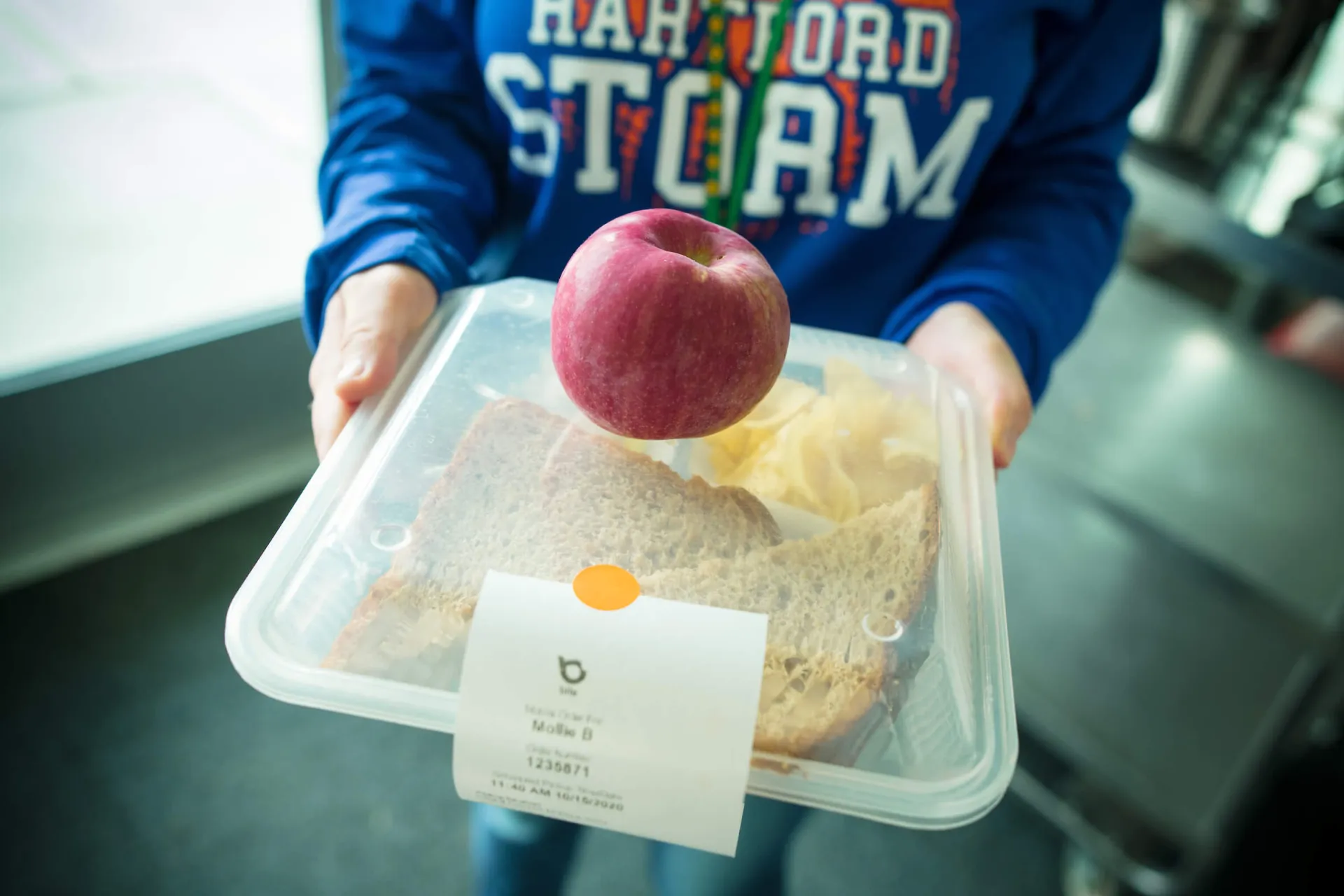The fight against waste doesn’t start in the recycling bin—it starts long before that. The first word in the “reduce, reuse and recycle” mantra is especially key to sustainability because it minimizes the amount of waste that’s produced in the first place. That’s the philosophy behind EcoWare, UVM Dining Service’s reusable container program. By focusing on the power of reduction, the initiative proves that sustainability isn’t just about what we throw away—it’s about what we never use in the first place.
“UVM Dining launched EcoWare in 2011, and we’ve been experimenting with ways to increase participation and maximize waste diversion ever since,” said Nicole Reilly, Sustainability and Strategic Initiatives Manager. In Fall 2024, the program received a major upgrade with the introduction of ReusePass, a web-based app for checking out reusable containers. This enhancement led to a 72% increase in participation and boosted the container return rate to 98%—up from just 48% in 2023–2024. As a result, the program prevented an estimated 5,813 pounds of disposable plates, cups, and bowls from entering the landfill.
The EcoWare program responds to a growing trend on college campuses: many students prefer the convenience of to-go meals over sitting down in dining halls due to their busy schedules. Initially, EcoWare operated on a membership model, charging $7.50 per participant to cover the cost of containers, dishwashing, and administrative expenses. The program used a simple exchange system—students would trade in a cow tag to receive a clean EcoWare container.
“During the COVID-19 pandemic we made some changes to the program, given the imperative for social distancing,” said Reilly. “At a time when most universities swapped reusable containers in favor of disposable alternatives, we upheld our program, ensuring it remained accessible and made it free for students to take meals to-go from the dining halls.” This increased utilization, but many containers weren’t returned.
“Participation was higher than ever before but without the containers coming back, the original intention of the program, to reduce waste, wasn’t being met,” said Corey Berman, Recycling & Zero Waste Program Coordinator in the Office of Sustainability.
"In 2022, our local composting facility stopped accepting compostable packaging, and in 2023, UVM’s Comprehensive Sustainability Plan set a goal to reduce waste by 10% per campus user by 2035,” explains Berman. These developments made EcoWare an increasingly vital part of UVM’s waste reduction strategy—especially as new technology solutions began to emerge to support and scale the program.
ReusePass was launched in direct response to customer feedback, with the goal of improving both convenience and flexibility. The upgrade made the EcoWare program free for all students, staff, and faculty, and enabled users to check out multiple containers at once. Each EcoWare container is labeled with a QR code, which is scanned at checkout and linked to the user’s unique ReusePass account—accessible online or via a mobile wallet. Much like borrowing a library book, the cashier scans the user’s code to check out the container. The app tracks borrowed items, return deadlines, and sends text reminders as due dates approach. In the spring semester, the program expanded to include a reusable mug option for coffee, tea, and fountain drinks at select retail locations.
The technology also has a dynamic dashboard, allowing operators to get real-time data about usage, return rates, and inventory. It also calculates sustainability impacts on the program. Reilly reports the following data from the past academic year:
- 60,900 EcoWare containers were checked out, and 98.5% were successfully returned
- 29% of the UVM community (including students, staff and faculty) participated in the program
- 37,976 gallons of water and 39,435 pounds of greenhouse gas emissions were avoided (resources that would have been required to produce and transport the equivalent volume of compostable containers)
“We work hard to educate the UVM community on the advantages of the EcoWare program, including the 25-cent discount when used in retail locations. “Now that students are adopting the technology, I think the program will grow in popularity with each succeeding class,” said Reilly. “We’re encouraged by these numbers, which shows that improvements in technology, education and a wide commitment among community members can yield real progress in our sustainability practices,” said UVM’s interim Sustainability Director Caylin McCamp.
Need another reason to choose reuse? Beginning in October 2025, UVM Dining Services will implement a $0.50 charge for each disposable food container at the Marketplace and Given Bistro—locations where both dine-in serviceware and ReusePass are available. This change aligns with efforts at other colleges and universities to reduce campus waste and is designed to further encourage the use of reusables, helping to significantly cut down on single-use packaging.
EcoWare was available via ReusePass at nine on-campus locations in 2024-2025: The four dining halls, plus The Marketplace, University Marché, Redstone Market, Given Bistro, and Waterman Manor. It will launch at The Halal Shack and Jamal’s Chicken in Fall of 2025.
